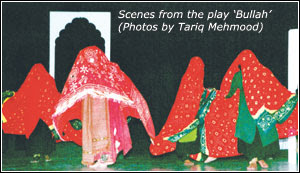17th June, 2007
By Fariha Rashed
Ajoka Theatre’s play, Bullah, performed last week in Lahore was very appropriately timed in that it brought with it a strong message of peace and tolerance. It revived the true spirit of Bulleh Shah’s poetry, as his poetic message intermingled with the popular genre of drama grasped everyone’s attention in the audience. It seems the recent ban placed on Burqavaganza that was accused of ridiculing the veil and disrespecting Pakistani culture has, in essence, managed to attract more crowds to Ajoka’s plays.
Bullah tells the story of sufi poet Baba Bulleh Shah. Based on the events that came to pass during his lifetime, the play carries a strong message of love and a plea for world peace. Bulleh Shah’s teachings are based on tolerance and the play suggests that in today’s conflicting times we should spread his message extensively.
‘Bullah’ tells the story of sufi poet Baba Bulleh Shah. Based on the events ofAjoka, known to stress on social issues through its plays, moulded Bullah to address the present state of chaos in South Asia. The play started on time and as the lights dimmed, the events on stage began with devotees carrying Bullah’s mortal remains in a procession, chanting his verse: “It is not me who is in the grave it is another.” The backdrop of the play is set in Punjab at the time of the decline of the Mughal empire in the early 18th century. Sona (Kamran Mujahid) and Chandi (Furqan Majeed) act as narrators, giving comments on what the sufi poet had to contend with on various occasions.
his life, the play carries a strong message of love and a plea for world peace
along with an impressive blend of various aspects of literature and the
performing arts.
The play is an example of what the magic of theatre is all about — an entertaining, live and interactive experience that carries with it a message that everyone can relate to. The play is a perfect blend of music and acting. Mian Shaharyar composed the music for the play and the kafis were sung by Khawar Ali Qawal and his ensemble accompanied by Arif Ali. As Sarfaraz Ansari (the lead actor who played Bullah) recited his poetry, the qawwals would enhance the recitations by offering their own music and voices as support. It was said that Sarfraz Ansari felt a personal affiliation with Bulleh Shah and elevated to a spiritual high while playing the role. This translated into a moving performance on his part.
The stage was not overly crowded with props and the lighting was impeccable. It created just the right ambience for each scene and gave depth to every character’s individual expressions. The dances were an important part of the play, lending through their movements a symbolic touch to the storyline. The live qawwali music intersecting throughout the play managed to enhance the performance marvelously. The actors themselves sang intensely and soulfully, clearly indicating that they were classically-trained singers as well.
The entire production was performed in Punjabi which is difficult to comprehend for many, but the actors’ powerful performances made understanding the story a whole lot easier. Lines were not forgotten, voices carried well across the entire stretch of the Alhamra hall and the space on stage was used intelligently by the actors which made the play visually appealing.
The dancers were in sync while the actors acting out the fight sequences were also quite agile. Both the dances and the fight sequences were choreographed with special attention paid to detail. The actors’ purposeful eye contact with the audience helped to keep them engaged for two whole hours. Eva Majid played the dancing girl Muradi Begum and Malik Aslam played Banda Singh Bahadur who avenged the deaths of Sikh saints. Both of them delivered convincing performances.
The last scene was one of the most powerful in the entire play and sums up the essence of the story: Bullah’s shrine is visited by devotees and Sona and Chandi proclaim that the sufi poet is still alive and loved through his teachings which will continue to live on for centuries after his demise.
The life history and contributions of Baba Bulleh Shah were artfully staged and accurately presented in Bullah. Madeeha Gauhar must be complemented for brilliant direction, Shahid Nadeem for writing a powerful script and Uzra Butt for strong choreography. The set designed by Aqeel Qazmi created an atmosphere which convincingly portrayed the living conditions and trends at the time of the sufi poet. The play is an impressive blend of various aspects of literature and performing arts that leaves a lasting impression on its audience.
Impressively, Ajoka is known to keep its set designs and backgrounds to a bare minimum, focusing entirely on acting, a strong meaningful script and brilliant background music. At the end of the day, the evening was a roaring success and it was good to see that the Pakistani public appreciates cultured theatre.


No comments:
Post a Comment